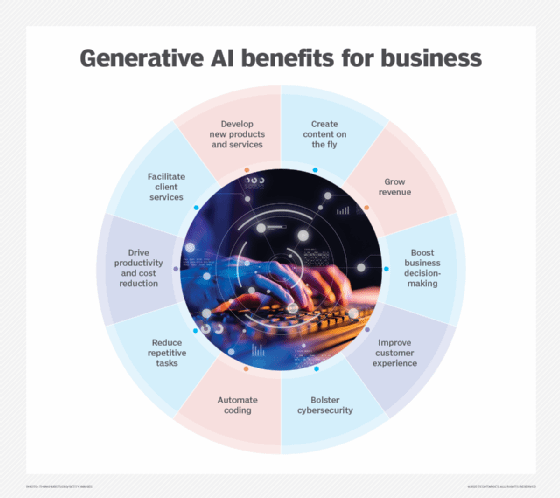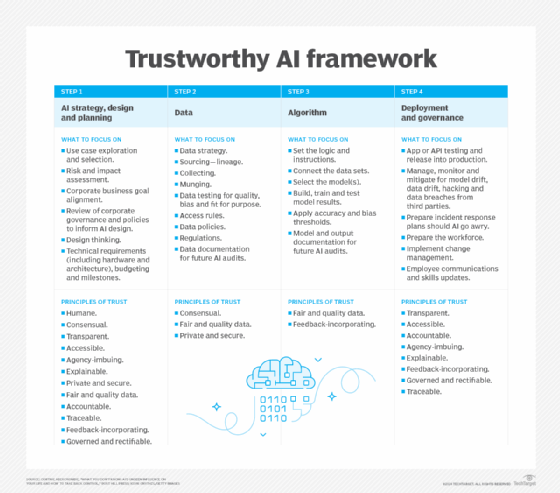What is AI democratization?
AI democratization, or the democratization of AI, is the concept that the benefits and control of artificial intelligence should be fairly divided among all people. AI democratization efforts claim that the power of AI will transform many aspects of our daily lives and, if it is properly directed, these transformations can benefit the majority of people instead of only a select few.
AI democratization is a new and changing area of discussion. It has started to solidify around four main areas, though: the wide availability of AI use, AI development, AI benefits and AI governance. These areas are not definitive and sometimes blur into one another.
In addition to larger socioeconomic issues, how to better democratize AI within an organization is a common concern.
Democratizing AI use
Democratizing AI use is the claim that artificial intelligence should be available to all regardless of nationality or economic status.
Historically, new technological advances have taken a trickle-down path in adoption. Often, technology is first used by wealthy people in advanced economic countries, then as it becomes cheaper to produce or easier to use, it becomes available to a larger and larger population.
Generative AI can avoid this long process, as a truly disruptive innovation. It is extremely easy to use, even a person who is unfamiliar with technology can adapt to using these tools quickly. Users only need a cellphone and internet connection to access them. Once deployed, it is relatively easy to add more users. With all this in place, AI could be used across the world.

Democratizing AI development
Democratizing AI development is the principle that anyone should be able to work with AI and customize it for their needs. AI development has typically demanded a lot of resources, including expert-level knowledge, computing power and money. AI democratization involves facilitating development by providing user-friendly resources and support -- such as prebuilt algorithms, intuitive interfaces and high-performance cloud computing platforms. Having those supports in place makes it feasible for in-house developers without special expertise to create their own machine learning applications and other AI software.
It is hoped that democratizing AI development can help alleviate issues with AI bias. AI's output is highly influenced by its training. Having a wider variety of people and viewpoints involved during training can, hopefully, make the resulting AI fairer and more equitable.
Democratizing AI benefits
AI is a powerful tool. Like all new tools, it can make people's lives easier and allow them to accomplish more work with less effort. It is hoped that democratizing the benefits of AI will help most people instead of only a select few. This means that AI needs to be available regardless of socioeconomic factors or nationality, and that the efficiencies benefit workers as well as corporations.
As AI continues to advance, it can widen the gap between people and countries that use it and those that do not. As certain jobs become more automated or even outright replaced by AI, how can those affected by these changes be helped instead of hurt?
As a brief thought experiment, if AI use means that a certain employee can now do the same amount of work in half the time, how should this affect them? The same amount of work for the same amount of pay, but half the working hours, or twice the work for the same pay and same hours?
Democratizing AI governance
AI governance are the rules and standards that AI must follow. This can include legal regulations, AI safeguards, AI bias, privacy and transparency. By democratizing AI governance, more people will have a say in these important aspects.
Currently, the companies that develop and deploy AI have the most control over these aspects. Many argue that those affected by AI use should have the most say in AI governance.
AI governance touches on areas like data protection laws, fair use and copyright. Existing legal frameworks in these areas might not be enough to cover the effects AI is having on society.

Democratizing AI in an organization
Many organizations are grappling with similar issues in democratizing AI with their workers. They want all to be able to use and benefit from AI. This might necessitate AI training or adoption programs so that no one is left behind.
By making AI development tools simple and available, workers can customize AI to their use. Also, by engaging with the workers, organizations can try to minimize bias or risks in the AI they use.
What happens when we use AI outside of a small group of experts? To avoid business problems, leaders need to invest wisely in AI tools and training for their employees. Learn more about how the democratization of AI creates benefits and challenges. Also, explore the road ahead for AI governance, see about differentiating between good and bad AI bias and learn about the pros and cons of AI-generated content.